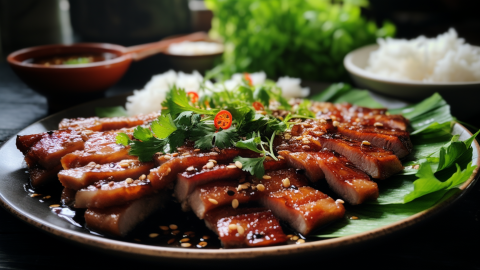What foods help replenish blood?
Generally, common blood-nourishing foods include red dates, spinach, pork liver, longan, black sesame seeds, and others. Consuming these foods in a balanced way helps supplement essential nutrients and supports improvement of conditions related to blood deficiency. Detailed analysis is as follows:

1. Red Dates
Red dates are rich in iron and vitamin C. Iron is a crucial component for hemoglobin synthesis, while vitamin C enhances iron absorption. Regular consumption of red dates helps replenish iron stores, supports hemoglobin production, and assists in improving symptoms such as pale complexion and fatigue caused by iron deficiency. They are suitable for daily use in blood nourishment.
2. Spinach
Spinach contains abundant iron and folic acid. Iron plays a role in hemoglobin formation, while folic acid promotes the development and maturation of red blood cells. Eating spinach provides these two key nutrients, supports normal red blood cell production, and positively contributes to maintaining healthy blood, making it one of the most common blood-boosting vegetables.
3. Pork Liver
Pork liver is an excellent source of iron, particularly heme iron, which is easily absorbed by the body. It also contains vitamin B12, a nutrient that promotes red blood cell production and maturation. Moderate consumption of pork liver can quickly replenish iron and vitamin B12, effectively alleviating symptoms of blood deficiency. It is suitable for individuals needing blood support when consumed in appropriate amounts.
4. Longan
Longan contains glucose, sucrose, vitamin A, B-complex vitamins, and iron. These nutrients provide energy to the body, while iron contributes to hemoglobin synthesis, helping increase hemoglobin levels in the blood. This can alleviate discomforts such as dizziness and palpitations caused by blood deficiency, offering effective blood-nourishing benefits.
5. Black Sesame Seeds
Black sesame seeds are rich in iron, protein, and various unsaturated fatty acids. Iron is a vital raw material for blood formation, while protein provides the foundation for tissue repair and hematopoiesis. Consuming black sesame seeds supplies iron and protein, supporting the body's blood production process. Long-term, moderate intake helps improve blood deficiency and maintain overall blood health.
When consuming these blood-nourishing foods, moderation is important to avoid overburdening the body—for example, excessive pork liver intake may lead to vitamin A toxicity. Additionally, blood nourishment requires consistent, long-term effort, and relying on a single food has limited effect. It is recommended to combine various blood-boosting foods with a balanced diet. If symptoms of blood deficiency are significant, medical advice should be sought promptly to identify the underlying cause and receive appropriate treatment.







